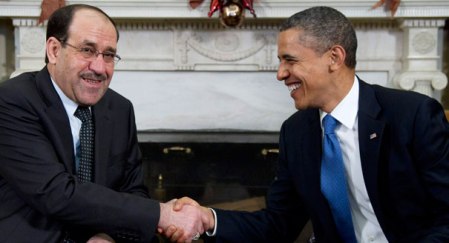
Iraq’s slide into sectarian civil war is conclusive proof, as if any were needed, that the US’s Middle East policies of the past twenty years have been an absolute catastrophe. Yet it is an indication of the neoconservatives’ endless capacity for stupid opportunism and self-delusion, that they see the current crisis as an opportunity to re-occupy Iraq.
The New York Times – which, you may recall, published false claims about Saddam Hussein having “weapons of mass destruction” – recently posted a puff piece devoted to the neoconservative “historian”, Robert Kagan. In it, we learn:
To Mr. Kagan, American action to stop the militants is imperative, but a continued military presence in Iraq and action in Syria would have averted the crisis. “It’s striking how two policies driven by the same desire to avoid the use of a military power are now converging to create this burgeoning disaster,” Mr. Kagan said in an interview.
Mr. Kagan apparently failed to notice that the presence of US troops in Iraq failed to stop a previous sectarian civil war in that country, one in which thousand of Sunni Muslims were driven out of Baghdad. As for “action in Syria”, I assume that what he means by that is going to war against the Assad government, which is fighting against ISIS, the same group that Kagan wants us to now fight in Iraq. Yes, this man is clearly a master strategist.
We do learn some interesting things from this article. For example:
But Exhibit A for what Robert Kagan describes as his “mainstream” view of American force is his relationship with former Secretary of State Hillary Rodham Clinton, who remains the vessel into which many interventionists are pouring their hopes. Mr. Kagan pointed out that he had recently attended a dinner of foreign-policy experts at which Mrs. Clinton was the guest of honor, and that he had served on her bipartisan group of foreign-policy heavy hitters at the State Department, where his wife worked as her spokeswoman.
“I feel comfortable with her on foreign policy,” Mr. Kagan said, adding that the next step after Mr. Obama’s more realist approach “could theoretically be whatever Hillary brings to the table” if elected president. “If she pursues a policy which we think she will pursue,” he added, “it’s something that might have been called neocon, but clearly her supporters are not going to call it that; they are going to call it something else.”
Those liberals who are “ready for Hillary” are in for a nasty surprise should she ever be elected president.
We also learn that Kagan is married to Victoria Nuland – yes, that Victoria Nuland. The article tells us that Nuland is:
… an assistant secretary of state and one of the country’s toughest and most experienced diplomats, whose fervor for building democracy in Ukraine recently leaked out in an embarrassing audio clip.
Just how stupid do these people think we are? Nuland’s notorious “fuck the EU” phone call showed a sneering contempt for democracy. It was all about her belief that she has a right to tell the Ukrainians how to run their country.
Meanwhile, Paul Wolfowitz showed up on Meet the Nation:
… on June 15 from his NBC platform, Wolfowitz opined that the current Iraqi violence could be traced to the absence of U.S. troops, suggesting that we should have stayed in Iraq just as we “stuck with South Korea for 60 years.”
Wolfowitz must surely be aware that the US pulled out of Iraq at the insistence of the Iraqi government. Such is Wolfowitz’s arrogance, that he doesn’t even pretend to care about the sham democracy that he helped to create. When asked what he would do about ISIS, Wolfowitz said, “I would do something in Syria.” Uh, you mean like drop bombs on people? The US has been dropping bombs on various parts of the Middle East for years now, and nothing much has really changed.
Even the ghoulish figure of Tony Blair has been resurrected. (George W. Bush appears to be too busy with his newfound career of painting, as well he should be.) He has been telling people: “We have to liberate ourselves from the notion that ‘we’ have caused this.” We need to liberate ourselves from the notion that we need to listen to the advice of people such as Tony Blair, Robert Kagan, and Paul Wolfowitz. Only then can we begin to understand what is going on in this world.









